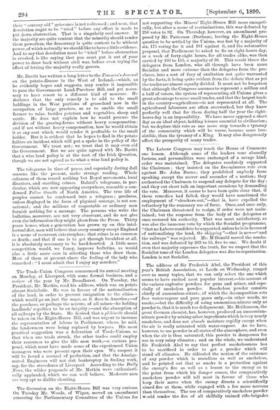The Labour Congress may teach the House of Commons one
lesson. Although some of the leaders were absurdly furious, and personalities were exchanged of a savage kind, order was maintained. The delegates resolutely supported the Chairman ; they insisted on the five-minutes rule even against Mr. John Burns ; they prohibited anybody from speaking except the mover and seconder of a motion ; they authorised the Chairman to suspend any delegate for the day ; and they cut short talk on important occasions by demanding the vote. Moreover, it seems to have been quite clear that, if these remedies had failed, they would have sanctioned the employment of " chuckers-out,"—that is, have expelled the refractory by the summary use of force. Once, and once only, the Chairman threatened to resign, if order were not main- tained; but the response from the body of the delegates at once restored his authority. That was most satisfactory, as was also the immense vote by which the Socialist programme, "that no Labour candidate be supported, unless he is in favour of of nationalising the land, the shipping "—that is new—" and the railways" was rejected. Mr. M'Donald moved the resolu- tion, and was defeated by 263 to 55, five to one. We doubt if even that majority expresses the truth, for we suspect that the Socialist tone of the London delegates was due to organisation. London is not Socialist.


































 Previous page
Previous page